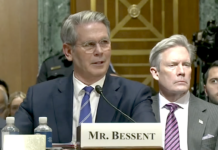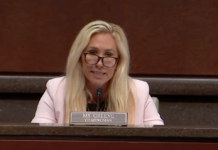
The number of suspensions and expulsions a school hands out could be removed from the formula to determine a key school ranking if a powerful GOP state lawmaker gets his way.
Counting disciplinary actions as part of the formula gives school officials incentives to mete out fewer punishments, Chickamauga Republican Jeff Mullis said Monday at a Senate Education Committee meeting.
“We don’t really believe that they’re actually disciplining students. They are dismissing it to keep their score down; that’s what we’re seeing,” he said. “And by not allowing it to be part of their scoring, we think that discipline will actually happen in a more strategic and more traditional manner.”
The number of suspensions and expulsions school hands out per student is a drag on 25% of the score in its annual School Climate Star Rating, along with factors including attendance, bullying incidents, drug use, and parent, teacher, and personnel surveys. The rating is part of a school’s College and Career Ready Performance Index, a key factor in determining which schools are eligible to become one of the state’s turnaround schools and become eligible to receive additional support and oversight from the state.
Mullis is the author of a bill that would remove student discipline from the formula that gives schools their 1- to 5-star ranking. He is chair of the Rules Committee, the gatekeeper who decides which bills make it to the Senate floor.
Mullis offered an example of a school where a fight breaks out and school officials could be tempted to punish the students for the infraction of pushing and shoving rather than fighting. Pushing and shoving carries a lower penalty and would count less against their score.
But how often schools are suspending and expelling students is relevant to its climate, said Sen. Elena Parent, Atlanta Democrat.
“The reason that these things started to be collected in the first place is there’s a lot of research and data that the way discipline is done and the culture around discipline in school really has a lot of importance and severe discipline like being suspended and excluded really has serious ramifications that we need to further research,” she said.
Education advocate Michael Waller agrees. He is the executive director of Georgia Appleseed Center for Law and Justice, a nonprofit focused on Georgia students. Keeping track of how students are breaking rules is an important step to fixing the causes of their behavior, he said.
“You want to focus on the community, the school community, you don’t just focus on the individual child, and looking at those discipline numbers helps schools realize what’s going on in the community,” he said.
Mullis’ bill does not stop schools from reporting disciplinary action. It only prevents the infractions from counting against their score, he said.
“We still want to be reported, but to take it out of that determination, so that their College and Career Readiness Performance Index is not affected, but the discipline hopefully will get even better,” he said.
Discipline is a major problem in Georgia schools, said Sen. Lindsey Tippins. But it’s important to monitor disciplinary actions to ensure they are even-handed so the public can know what is going on in their schools.
“I’m in a position where I could argue either side of the bill because I think both sides are right, and I don’t know what the solution is,” Tippins said.
Tippins’ sticking point is how to ensure members of the public can access a schools’ disciplinary data if it were no longer a part of the ranking. A family choosing a new home deserves timely access to know how often kids in local schools face disciplinary actions, he said.
“I would say the solution is to define in this bill as we change it what will be available, where it will be available and when it will be available,” he said.
The committee voted unanimously to make changes to spell out how schools would make their disciplinary information available. The revised version could be considered Wednesday.
But requiring the Georgia Department of Education to come up with a new mechanism to publicize school discipline data would only make it harder for parents to find the information, Waller said.
“You’re going to put an additional regulatory burden on the (Department of Education) and construct another label or some other mechanism to get that information out,” he said.
“We’re all in this together, we’re a community, and we should be trying to figure out ways to cut these numbers down,” he added. “And if some school districts are not doing what they’re supposed to do as far as reporting, the solution is not to stop making them report, it’s to enforce the existing rule and find the reasons why schools aren’t reporting and provide them with support to help them.”
This article is published in partnership with Georgia Recorder







